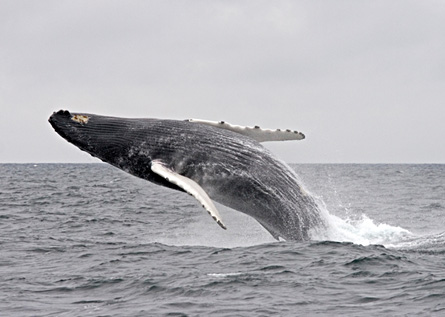The International Whaling Commission begins its60th meeting Monday amid hopes — and fears — that this year will be different.

The commission’s delegates gather in Santiago, Chile, for five days for their annual review of whale hunting rules.
Formed as an international body to set quotas and regulate the whaling industry, the commission, with 81 member countries, in recent years has been torn — some would say deadlocked — in a fight over whether whales should be hunted at all.
In 1986 the commission instituted a moratorium on commercial whaling, though the commission permits some limited subsistence hunts by traditional peoples. Japan, Norway and Iceland object to the moratorium, and whalers from all three countries continue to catch whales under various rationales. Japan declares that its fleet continues to catch several hundred whales a year for scientific rather than commercial purposes, a contention that conservation groups criticize.
“The IWC’s polarization is compromising its ability to properly conserve and manage cetaceans,” William Hogarth, of the University of South Florida, told a subcommittee of the U.S. House Committee on Natural Resources on June 10. Hogarth is the current chair of the whole IWC but emphasized he was testifying in his capacity as leader of the U.S. delegation.
“More than 15 years of negotiations regarding the Revised Management Scheme [regulating commercial hunting of baleen whales] have reached an impasse, as declared by the IWC, in early 2006,” Hogarth told the committee.
The stalemate drove the IWC to take the unusual step in March 2008 of convening a special session to talk about the difficulties and the organization’s future. Conveners invited diplomats who had worked on difficult international issues, including Ambassador Alvaro de Soto, who participated in peace negotiations in El Salvador and in Cyprus.
Hogarth’s report on the session includes some sunny spots. Starting in 2007, he said, he “sensed a different attitude toward discussion and believed that this was a good sign for finding a way forward.”
On the flip side of these hopes are fears from conservationists that the antiwhaling nations will compromise so much that they essentially gives in to the pro-whaling nations. “The United States, which was once a leader in whale protection at the IWC, has lost its resolve to stand strong for whales, and as a result its influence with the IWC has waned,” says a statement from the Humane Society of the United States.
“Now is not the time to capitulate to calls to weaken or undermine the existing IWC ban on commercial whaling,” said House Natural Resources Committee Chairman Nick Rahall (D-WV) in May. He and colleagues sponsored a resolution, which the House passed June 18, calling for the U.S. delegation to oppose all forms of commercial whaling.
The concerns grow out of proposals such as Japan’s ideas for allowing what’s being called small-type coastal fishing for some of its whaling operations. Hogarth told the congressional committee that the United States has not previously supported this idea and that, in any case, such proposals should have scientific evidence behind them.
What counts as science has become a contentious topic. Japan’s designation of its program of scientific whaling draws fire from conservation groups who say it is basically commercial whaling under a new name. Most other whale biologists emphasize observing the living animals and don’t design research programs that require killing hundreds of whales, said Patrick Ramage of the International Fund for Animal Welfare. “There are only so many things you can learn from a dead whale,” he added.
The fate of commercial whaling has rendered even membership in the commission a hot topic. Countries have joined right before, and sometimes during, an international meeting. (Congo became a member at the end of May but hasn’t been added to the membership list on the IWC website.) Japan in particular has been accused of recruiting its foreign aid recipients to discover a sudden interest in whaling and join the IWC to vote along with the country.
Regardless of international diplomacy, some of the developing nations opposing the whaling ban say whales need culling because they’re ravaging already stressed fisheries. Research to be presented at the meeting counters this claim, according to the Humane Society International.
In all this ferment, the IWC has an opportunity to reinvent itself as a whale science and conservation organization, Ramage said. “The International Whaling Commission could become the International Whale Commission,” he added.







